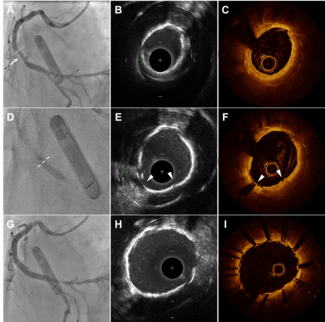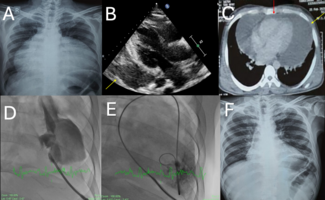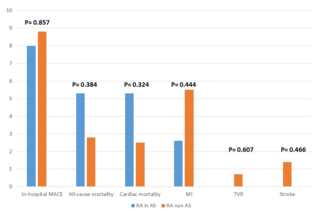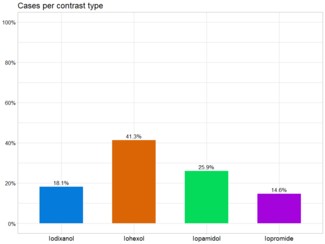Digital Hand Embolization as a Complication of Substance Abuse
Key words: digital arterial embolization, drug abuse, peripheral imaging
A 54-year-old male with a history of cigarette smoking and active intravenous drug abuse and multiple other comorbidities presented to the emergency department complaining of chest pain and left middle finger pain. He had electrocardiographic changes and positive cardiac troponins. An urgent cardiac catheterization showed severe coronary artery disease and poor ventricular function. Peripheral angiography of the left hand revealed an abnormal circulation to the third digit, where the lateral digital artery and medial digital artery appeared to have an abrupt cut off suggestive of embolization (Figure 1). Given the patient’s significant history of poor compliance, he was managed medically and discharged after vascular surgery evaluation. He later had an amputation of his left third digit.
Substance abuse is a major health problem in the United States and a leading cause of hospitalization and emergency room visits. The health consequences associated with systemic drug use vary between patients and include local and systemic physiological and infectious complications related to the injected substance or the additives. Intra-arterial injection of recreational substances and drugs is less well described in the literature. It can be accidental or intentional due to “burnout” of available veins to be used for injection. It carries a risk for hand ischemia and embolization to the hand digits and ultimately amputation. An early recognition of the signs and symptoms and complications of intra-arterial injection of addictive or illegal drugs can lead to early initiation of appropriate therapy and prevention of tissue loss, gangrene and, possibly, reduction of the rate of amputation. Physicians should remain vigilant and inquire specifically about intra-arterial injections in patients who demonstrate the signs and symptoms of limb ischemia.
From 1UCONN/Hartford Hospital/UConn Health, Hartford, Connecticut; 2Beaumont Hospital Dearborn, Dearborn, Michigan; 3Lahey Clinic/Lahey Hospital and Medical Center Burlington, Burlington, Massachusetts; and 4University of Utah/University of Utah Hospital, Salt Lake City, Utah.
Disclosure: The authors have completed and returned the ICMJE Form for Disclosure of Potential Conflicts of Interest. The authors report no conflicts of interest regarding the content herein.
The authors report that patient consent was provided for publication of the images used herein.
Manuscript accepted July 11, 2019.
Address for correspondence: Amged Abdelaziz, MD, MS, Beaumont Hospital Dearborn, 18101 Oakwood Blvd, Dearborn, MI 48124. Email: amgedabdelaziz@yahoo.com



















